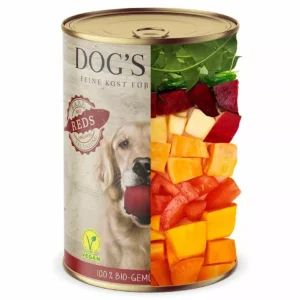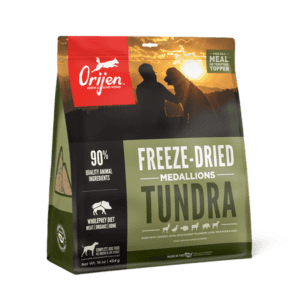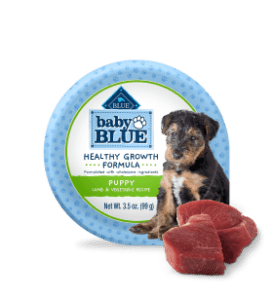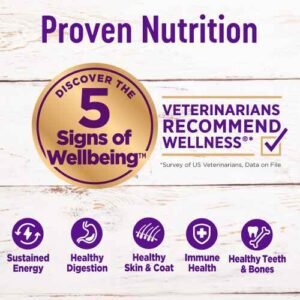The Ultimate Guide to Organic Dog Food
The pet food business has seen a notable movement in favor of organic goods in recent years. Consequently, organic dog food is becoming increasingly popular as more pet owners are becoming aware of what they are feeding their animal pals. In this in-depth guide, we will cover everything you need to know about organic dog food, including its advantages, key ingredients, and how to pick the best food for your beloved pet.
What is Organic Dog Food?
GMOs, artificial fertilizers, and pesticides are not used in the cultivation of the components that make up organic dog food. Furthermore, these foods frequently adhere to strict guidelines established by agencies that accredit organic goods. As a result, this ensures that they satisfy particular requirements for both origin and quality.

Organic Ingredients:
The best guide of organic Dog Food made without artificial chemicals, synthetic pesticides, or harmful additives are grown naturally, supporting environmental health and promoting biodiversity. Organic farming focuses on eco-friendly practices like soil conservation and water management, ensuring a more sustainable ecosystem. These ingredients provide a healthier option for consumers while protecting both the environment and local wildlife.
Certified Organic:
Products inspected and certified by a recognized organization meet strict organic farming standards, ensuring they are free from synthetic chemicals, GMOs, and artificial additives. This certification process includes rigorous checks on farming practices, ingredient sourcing, and environmental impact. Certified organic products offer consumers a trustworthy, healthier, and environmentally friendly option.
Non-GMO:
Non-GMO products are made without genetically modified organisms, preserving their natural genetic makeup and nutritional value. These products provide a healthier, more natural option by avoiding genetic engineering and supporting traditional farming methods. Choosing non-GMO also helps protect biodiversity and promotes sustainable agricultural practices.
Benefits of Organic Dog Food
Improved Health
Organic canine meals is regularly richer in vitamins in comparison to traditional options. This is frequently due to the fact natural meals commonly keep away from synthetic additives, fillers, and preservatives. By supplying a extra herbal diet, puppies gain from a better attention of vitamins, minerals, and crucial fatty acids. This balanced nutrients can result in higher universal fitness, selling a more potent immune device and progressed power levels. Additionally, natural elements can also additionally assist save you fitness issues, ensuing in a longer, more healthy lifestyles for pets.
Allergies and Sensitivities
Many puppies be afflicted by meals sensitivities or allergies, that can result in uncomfortable signs and symptoms like itching, digestive upset, and pores and skin issues. Organic canine meals regularly incorporates fewer elements, that can lessen the danger of allergic reactions. With a less difficult aspect list, puppy proprietors can extra without difficulty become aware of ability allergens and keep away from them. This method can assist puppies with touchy stomachs or unique meals intolerances thrive, as natural meals commonly use high-quality, without difficulty digestible elements which are gentler at the digestive device.
Environmental Impact
Choosing natural canine meals now no longer best blessings your puppy however additionally helps sustainable agricultural practices. Organic farming strategies lessen using artificial insecticides and fertilizers, that can lower pollutants and enhance soil fitness. For puppy proprietors who’re environmentally conscious, choosing natural canine meals is a manner to make a contribution to a more healthy planet. By prioritizing natural options, purchasers assist sell biodiversity and aid farmers who’re devoted to sustainable practices.
Better Quality Control
Smaller, more regulated farms are frequently the source of organic dog food, which could result in higher overall quality and safety requirements.
Nutritional Considerations
Ingredients to Look For
Knowing which elements are useful is crucial when selecting organic dog food:
- Whole Grains:They’re full of fibre and vitality, such brown rice and oats.
- High-quality Proteins:As your main sources of protein, try to get organic meat, fish, or chicken.
- Fruits and veggies:Include vital vitamins and minerals in your diet with organic fruits and veggies.

Organic Fruits & Vegetables for dog
Avoiding Harmful Ingredients
It’s equally crucial to stay away from dangerous substances that some dog diets may contain:
Artificial colouring and preservatives: Over time, these may cause health problems.
By-Products: Meat by-products of poor quality may be detrimental to your dog’s health.
Fillers:Nutritively unimportant ingredients such as maize and soy.
Understanding Labels and Certifications
Organic Certification
Seek for goods that have received the USDA (United States Department of Agriculture) organic certification. This certification guarantees that the product satisfies high requirements.
Ingredient Transparency
reputable companies will supply a transparent ingredient list along with sourcing details. Select brands that are open about how they manufacture their products.
Types of Organic Dog Food
Dry Food (Kibble)
Dog owners choose organic kibble because of its shelf stability and ease of use. Make sure the kibble you choose has whole grains and high-quality proteins.
Wet Food (Canned)
For dogs who enjoy a moist diet, organic wet food can be a terrific choice. It frequently has lower carbohydrate content and higher protein content.
Freeze-Dried and Dehydrated Foods
These choices offer a raw diet experience while preserving nutrients. Though they offer a handy approach to supply high-quality, organic food, they must be rehydrated before feeding.
Homemade Organic Dog Food
Making your own dog food gives you complete control over the ingredients. But to guarantee a balanced diet, meticulous planning is needed.
How to Transition to Organic Dog Food?
Gradual Change
It’s important to gently transition your dog to organic food over a period of 7–10 days in order to avoid upset stomachs. Gradually increase the amount of organic food they eat by starting with a modest amount mixed with their regular diet.
Monitor Your Dog’s Health
During the changeover, pay attention to your dog’s energy levels, behaviour, and coat quality. A veterinarian should be consulted regarding any negative responses.
Common Misconceptions About Organic Dog Food:
Organic is Always Better
Although foods that are organic are generally healthier, it is important to evaluate each product separately. Nutritually, organic foods differ from one another.
Organic Food is Too Expensive
Even though organic dog food can cost more, a lot of pet owners believe it’s worth the money for their dog’s wellbeing. Furthermore, the long-term advantages may exceed the upfront expenses.
All Natural Equals Organic
Not every food labelled “natural” is organic. To be sure the product satisfies organic requirements, always look for the organic certification.
 Image Source/@Thebussinessinsider
Image Source/@Thebussinessinsider
Dog Food brands that offer Organic Food:
When seeking out the first-class natural canine meals manufacturers, numerous alternatives stand out because of their high-satisfactory elements and dedication to puppy health. Here`s a listing of a few pinnacle manufacturers that provide natural canine meals:

Orijen:
Known for its excessive protein content material and use of clean, complete elements.
Features: Grain-loose alternatives, made with loose-run poultry, wild-stuck fish, and clean end result and vegetables.
Reviews: Loveland, Colorado wrote ,
Bowl Licking Good! 5 stars/ 5 stars
“I started my 1 year old Chihuahua “Zero” on the Orijen life diet as a pup, with the dry kibble. It wasn’t until 3 months ago that switched him to the Freeze Dried mixture. He absolutely loves each meal! The Tundra blend has more texture compared to the Regional Red and Original blends. On his recent Vet visit I was told he has excellent nails, fur, and weight. I attribute this to his diet. He has never had diarrhea or throw up from eating this type of food. I usually feed him the original for breakfast and switch between the regional red or tundra for his dinner.”
Review is from Orijen.
Blue Buffalo:
Offers a number natural canine meals products, emphasizing herbal elements.
Features: Contains no synthetic preservatives, colors, or flavors.Here’s an example product from the original website.

My pup loves this
“My pup loves this mixed in with her kibble! I love that it doesn’t smell like dog food, like a bad odor.”
Wellness:
Popular strains consist of Wellness CORE,

which functions grain-free, high-protein recipes; Wellness Simple, designed for puppies with meals sensitivities; and Wellness Complete Health, that specialize in common well-being for unique lifestyles stages. When transitioning to a brand new meals, consulting your veterinarian is recommended, mainly for puppies with precise nutritional needs.
Review: 5 out of 5 stars.
Finicky Eater’s Favorite Food
“My Rottsky-mix has always been a finicky eater. However, when someone gave this to my husband for our Genesee, I wasn’t very hopeful. However, I was very happily surprised with how much she loves eating this food!”
Merrick:
Merrick is Known for its high-satisfactory and kind of recipes, together with natural alternatives.
Features: Made with actual meat, no synthetic preservatives, and gluten-loose.
If you want to know if the merrick is good brand for your dog visit this article ,Is merrick dog food good for your dog?
Choosing the Right Organic Dog Food Brand
Research Brands
Seek out companies that have a good track record and endorsements from other dog owners. Examine their ingredient lists and sourcing policies.
Speak with Your Vet.
Before making any major dietary changes for your dog, always get advice from your veterinarian. They can provide tailored advice based on the medical requirements of your dog.
Making mistakes and trying again
It could take some trial and error to find the best organic dog food. Keep an eye on your dog’s reactions to various brands and formulas.
FAQs About Organic Dog Food
Conclusion
Dog food made from organic ingredients has several advantages for the environment and dogs. You may enhance your dog’s health and wellbeing by selecting premium organic items. When considering nutritional adjustments, never forget to speak with your veterinarian. Also, take your time in finding the finest solutions for your pet. If you arm yourself with the correct knowledge and tools, you can make sure your dog eats a healthy, fulfilling diet for many years to come.
Further Reading
- Books on Canine Nutrition
- Online Courses on Dog Diets
- Pet Food Industry Reports
This detailed guide should provide a solid foundation for your blog on organic dog food. If you need additional sections or specifics, feel free to ask!
More About Dog foods.
1-Dry Dog Food for Small Breeds
3-Is Pure Balance a Good Dog Food?
4-Is Blue Buffalo Good Dog Food?
5-Best Dog Food for Rottweilers
6-Is Purina Pro Plan a Good Dog Food
7-The Best Dog Food for Poodles
8-Best Dog Food for Golden Retriever Puppies
9-Best Dog Food for Siberian Husky
10-Best Dog Food for Dachshunds:
11-Nature Dog Food: The Best Choice for a Healthy Dog
12-Best dog food for French bulldogs
13-American Natural Premium Dog Food
14-The Importance of Dog Food Protein:
16-Where to buy the farmer’s dog food?
18-“Best Dog Food for Allergies:”
19-Hydrolyzed Protein Dog Food:
20-What can I Feed My Dog over dog food?
21-Top Guide to Freeze Dried Raw Dog Food
23-Is Merrick Dog Food Good for Your Dog?
25-Is Cesar Dog Food Good 5 Surprising facts
26-Is Royal Canin a Good Dog Food brand?
Thank you for writing this post. I like the subject too.